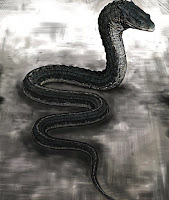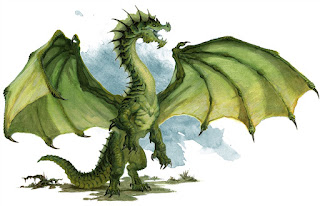Week 2 Story: Mary and the Basilisk
 |
| The Basilisk |
 |
| Mary |
And so the mother traveled to the town market and found many things, such things that her eldest daughters would enjoy. The journey back home was long, and even longer in the dark. As night fell, it became harder for the mother to find her way back, especially for someone traveling alone. Through the forest she came across a palace which seemed strange-she did not recall seeing a palace before. While pondering this, the mother wandered into a beautiful rose garden just outside of the castle. Remembering Mary’s words, she picked three of loveliest roses she could find.
Suddenly, a great and fearsome serpent appeared from behind the rose bushes. “How dare you steal from my garden?” he bellowed in a deep, hissing voice. The startled mother was so afraid that she dropped the roses. “These are for my daughter, but please, I do not need them.” This gave the serpent a pause, who then replied, “No, the damage has been done. In return for three roses, your daughter must stay here for three days time. Then all will be forgiven.” He lowered his harsh face closer to the mother’s, who recoiled instinctively. “Do this, or else,” he threatened. “Tell her to come here and ask for the Basilisk.” With that, the beast slithered away and into the castle.
Frightened, the mother picked up the roses and travelled home as fast as she could. Her daughters were there to greet her at the door, the two eldest reaching for the fanciful items from the market. The young Mary helped her mother inside, though as she greeted her with a smile, it disappeared upon seeing her mother’s concerned face. “Is everything alright?” She asked. The mother pulled her aside, explaining everything that had happened that night. “My dear, I am sorry for the trouble I have caused you. I am afraid that he will do something terrible if you don’t go,” she said fearfully. But her daughter only smiled kindly and said, “It is alright. I apologize for troubling you for the roses. If I must stay with Basilisk for three days, then that is how I shall repay him.”
And so Mary made a pack for three days worth and set off for the hidden palace in the forest. Upon arriving to the same garden that her mother found, she called out for the Basilisk. The snake-like beast emerged from the castle in all his fearsome greatness, though Mary was not afraid. In fact, she felt guilty for her actions and bowed her head low. “Please do not think harshly of my mother when the fault is mine. I apologize for disturbing your garden. As promised, I shall stay here for three days.” The Basilisk huffed, “Do not concern yourself so much. As long as you fulfill your payment, I will not think harshly of you or your mother.” The serpent led Mary to a lavish bedroom inside of the castle. “You may make yourself comfortable here, and should you need anything you may ask for it,” he insisted before slithering away. Mary wondered if this was the same Basilisk that her mother had encountered.
On the first day, Mary was called into the serpent’s living quarters to nurse the Basilisk. “It is hard to care for oneself without limbs,” he said. And so she took care of him throughout the day. Because he could not cook or eat without making a mess, she fed him. When he could not reach for his back when washing, she bathed him. And when he could not relax as his tail lashed about in agitation, she made him rest his crested head on her lap. “You seem familiar with all of this,” he commented. “I have my mother and two older sisters, so I like to help them when I can,” she replied.
“That is very admirable of you.”
On the second day, Mary was called into the library within the castle to read to the Basilisk. “It is hard to remain astute without practice,” he said. And so she read to him throughout the day. Because he could not reach for the books without knocking them over, she pulled out a selection for him. When he wanted to be studious and complete research, she lectured him. And when he wanted to be entertained with a good book, she would tell stories of comedy and romance. “You seem to enjoy this,” he noticed. “I live far away from the town, so I like to read as much as I can,” she replied.
“That is very wise of you.”
On the third and last day, Mary was called out into the garden where she and the Basilisk first met. The serpent, carrying a sword between his sharp teeth, dropped it at her feet. “It is hard to slay yourself,” he admitted solemnly, “when you cannot bring yourself to do it. You must cut off my head.” She backed away in horror. “What are you saying? How could I ever bring myself to do such a thing?” she cried. But the Basilisk snapped, “You must slay me! Do this, or else.” Terrified, Mary picked up the sword, and the serpent lowered his head to the ground. Tearfully, she brought down the sword and cut off his head. But the once headless serpent grew a new one. “Again!” He shouted in frustration. Mary cut off the new head of the Basilisk, this time without hesitation.
Suddenly, the serpent’s body dissipated, and lying on the ground was a young man. Mary dropped the sword and helped him to his feet. Though she did not know the handsome youth, she realized his eyes where those of the Basilisk’s.
“Thank you for helping me,” he said kindly. “This is my real form. In truth, I am the wizard of this castle. I made a mistake when casting a spell, turning myself into a Basilisk. None of my attendants recognized me and left in fear. I needed someone to destroy my body to reverse the spell.” He hung his head in shame. “I apologize for threatening your mother. And you. I feared it was the only way.” She reached for his hands in encouragement. “I forgive you.”
He huffed, “It is still not enough. I would like to repay you for your kindness. I will be holding a celebration for my return, and you and your family are invited.” Sheepishly, he added, “if that would be to your liking.”
“That is very kind of you,” she replied.
And so the wizard held a grand ball, and everyone partied and danced joyfully, as did Mary and her family. All was well, and ever after Mary returned to the castle by her own will. As the two had fallen in love, Mary and the wizard married, living happily in the palace forever more.
—
Author’s Note
I enjoyed reading Kubín’s The Three Roses, which seems like the Czech version of Beauty and the Beast. It has a good structure to begin with, though I wanted to retell the story in a way that makes sense for modern times and fits my own personal tastes. I like to read into a character’s background and motivations, which I found the original story to be lacking. Going off of my notes and some of the context clues—if you squint—I developed the characters in a way that gave them personality and made their actions meaningful.
The mother went through the least amount of change, and the sisters seemed indifferent in the plotline, so I described them as such. Since Mary and the Basilisk are the main characters of the story, they went through the greatest change in order to act the part. Mary is still kind and patient, somewhat more than what’s good for her, but in the end she is deserving of good things. The Basilisk is more complex in my retelling, where his words and his actions conflict with one another, but he’s still a likeable character. I can’t stress enough how much I dislike tropes involving Stockholm Syndrome, girl falls for the bad guy or the guy with no personality, etc.
I also noticed how significant pairs of three were in this story—three daughters, three roses, three days, three hours of nursing per day, three forms of the Basilisk—and yet there wasn’t any connection made. So I wrote in threes where three made sense. Three roses to be equal to three days at the castle. Three days for the main characters to get to know one another and have dialogue, instead of just three hours. Lastly, how does explain cutting off one’s head in order to become human again? Make him a wizard, that’s how. Magic makes sense in storytelling. It’s a creative liberty, but it works.
Bibliography: “The Three Roses” from Czech Folktales by Josef Štefan Kubín (translated by Josef Baudiš). Web source.
Image Sources
The Basilisk
Mary


Hi Natalie!
ReplyDeleteThis was amazing to read! I also wrote my story over The Three Roses and did not realize some of the things you mentioned in your author's note. For example, the numerous times the pairs of three were referenced. Your story was full of detail and offered insight into the characters' background and feelings. Through your story, I was also able to learn a few things!
Howdy,
ReplyDeleteThis was a fun story. I really love how genuine and caring you made Mary. I really got a sense for how sweet and kind she was. Her sisters seemed like a bit much, but she was pure of heart. I was curious as to why Mary had to cut off the head of the basilisk twice, why was once not sufficient? Or why did it grow back?